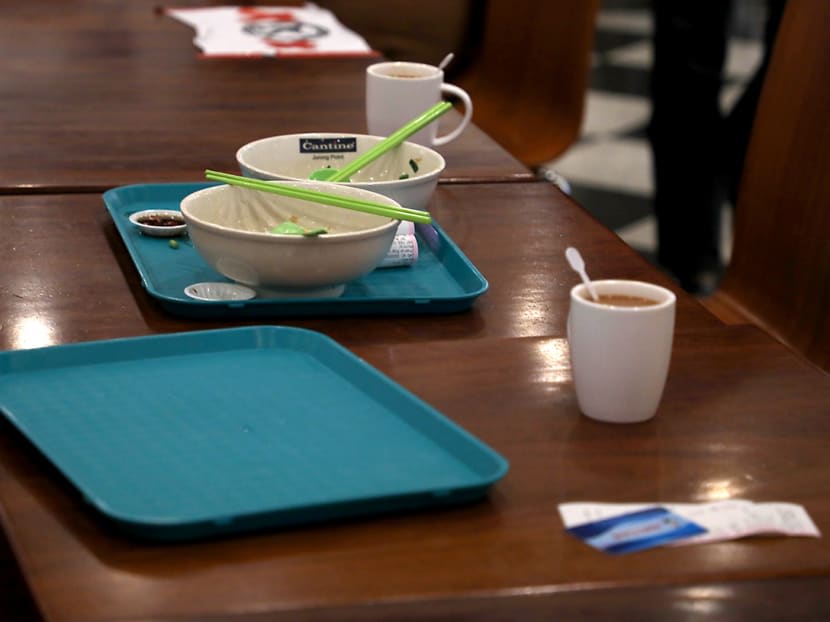Over 7,000 diners advised to return dirty dishes at coffee shops, food courts during 2-month advisory period
SINGAPORE — More than 7,000 people were advised to clear their used dishes and trays at coffee shops and food courts across the island during November and December this year.

Strict enforcement of rules requiring diners to return trays and dishes at coffee shops and food courts will kick in on Jan 1, 2022.
- From Jan 1, warnings and fines will apply to diners at coffee shops and food courts who do not return used dishes and trays
- During an advisory period in November and December, more than 7,000 diners received advisories, the Singapore Food Agency said
- The rules were introduced for hawker centres on Sept 1, 2021
- Since then, only one person has been issued with a written warning
SINGAPORE — More than 7,000 people were advised to clear their used dishes and trays at coffee shops and food courts across the island during November and December this year.
This is a two-month advisory period where customers were not issued fines for not clearing their dirty trays to give them time to adjust to full enforcement of the new rule, which kicks in on Saturday (Jan 1).
In response to queries from TODAY, the Singapore Food Agency (SFA), which manages coffee shops and food courts, said on Thursday that almost all of the more than 7,000 diners who were issued with advisories had complied.
"Since the start of the advisory period in November, our officers have observed that diners at these premises have generally been taking the initiative to clear up after themselves, and return their dirty trays and crockery after eating," it added.
The new rule requires customers to return their own dirty trays and dishes, and dispose of litter after eating. First-time offenders will be issued with a stern warning, while second-time offenders face a S$300 fine.
The expansion of this enforcement to coffee shops and food courts comes three months after it started for hawker centres.
According to Dr Amy Khor, Senior Minister of State for Sustainability and the Environment, the average tray and crockery return rate at hawker centres had increased from 33 per cent in February to 84 per cent in November.
“What we are doing here really is to give a strong nudge, encourage members of the public to pick up this habit and we hope that over time, this becomes second nature to them.Dr Amy Khor, Senior Minister of State for Sustainability and the Environment”
Speaking to the media on Thursday, Dr Khor said that previous efforts to get diners to clear their own trays did not result in significant improvement, but things changed after it was made mandatory.
"I think it is a combination of factors. Obviously, making it mandatory would help nudge in this direction," she said.
"But it is also increasing awareness with the Covid-19 pandemic, as well as with many messages about the need for higher standards of public health and cleanliness and hygiene from various stakeholders."
Dr Khor also said that almost all coffee shops and food courts have equipped themselves with the tray return facilities, as compared with just 20 per cent in July.
Safe distancing ambassadors and enforcement officers will be making sure customers would adhere to the new regulations.
They would first advise customers to return their dirty used dishes, and no enforcement action will be taken if they comply. For those who don't, a written warning will be given to first-time offenders. Those who repeatedly fail to return their trays will face financial penalties.
Reiterating a point made in previous government announcements, Dr Khor said that those who are unable to return their own trays, such as the young, old and disabled, would not face any enforcement actions.
Since enforcement started at hawker centres on Sept 1, only one person has been issued a written warning, she noted.
Dr Khor was asked whether there will be enough manpower to ensure that customers are abiding by the new rules given that safe distancing ambassadors are mainly temporary jobs that emerged during the Covid-19 pandemic.
She responded that there is currently enough manpower but the authorities will continue to monitor the situation and make adjustments if necessary.
However, she added that safe distancing ambassadors and enforcement officers can't be at every coffee shop and food court at all hours of the day.
"What we are doing here really is to give a strong nudge, encourage members of the public to pick up this habit and we hope that over time, this becomes second nature to them," she said.
In fact, we hope that we don't need to enforce because we actually want this to be a habit that everybody picks up."
Dr Khor said that feedback from customers, stallholders and coffee shop operators thus far has been positive.
She added that the eating environment had been cleaner, with fewer problems related to birds eating leftover scraps of food.
SFA noted that cleaners can now focus on wiping and sanitising tables, as well as clearing and sorting dirty crockery at the designated tray and crockery return points.
"This also facilitates the faster turnover of tables during peak mealtimes, which benefits diners as well as stallholders and operators," it added.








